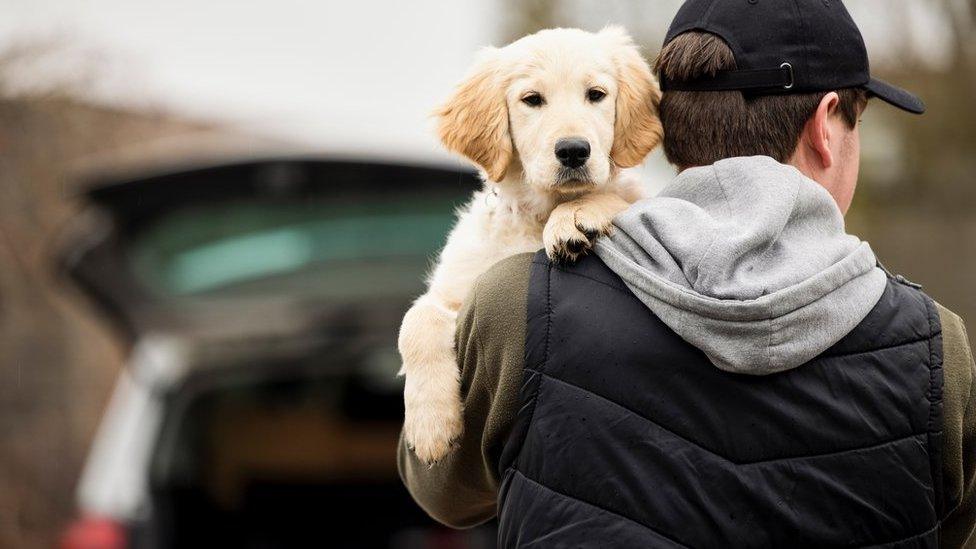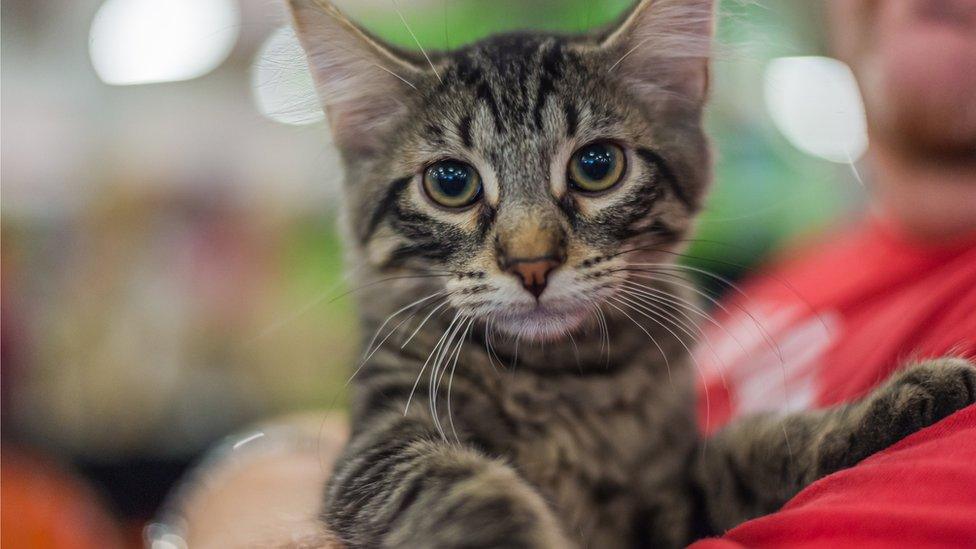Pet theft: Six percent of animals reported stolen recovered
- Published

Six percent of stolen dogs were recovered in the capital so far this year
Just six percent of stolen animals in London have been recovered so far this year, Met Police figures, external have shown.
The data, calculated until the end of November, showed 654 animals were stolen.
Dogs were the most common victims, with 335 stolen so far this year. Other pets including cats, fish and birds were also taken.
The Met Police has encouraged owners to microchip their pets where possible and to report all thefts.
It also advised against leaving pets unattended in gardens.

Hounslow has seen the most thefts this year, according to the figures, with 93 individual animals reported stolen between January and November, including an incident in which 50 birds were taken in October.
'Upset and nervous'
In 2022, 1,713 animals were reported stolen in London, the highest number since Met Police records began.
The number of thefts is on track to decrease this year, after a steady rise in recent times.
The rate of recoveries so far this year is 3% higher than in 2022.

Despite these improvements, the number of Londoners who are united with their reported stolen pets is less than 10 percent.
One of the fortunate victims was Claire Hachem, whose dog Buddy was stolen from outside a shop in Hayes, west London, earlier this year.
The collie-corgi cross is a vital part of the family, as he serves as a support dog for Claire's 10-year-old autistic son Ruben.

Buddy was found abandoned after being stolen two days earlier
"I got very upset and nervous (when Buddy was stolen)," she said.
"I tried to look for him straight away. I went up and down the street, I couldn't see any trace of Buddy."
Claire called her other son to help find the missing dog.
"He came immediately and we did everything possible. We went on to every road, we were calling his name, there was no sighting of Buddy at all."
'Life without him would be a disaster'
Dog thefts have become an increasing problem across the UK in recent years, with London being the region where most are stolen, according to a report by insurance firm Direct Line., external
Last year, 436 dogs were reported stolen in the capital, with only 9% recovered.
The UK average recovery rate was 12 percent, also according to the Direct Line report.
After finding no sign of Buddy in Hayes, Claire continued the search online.
"I started to dig on Facebook," she said.
"I came across some volunteers and I asked, 'how do I go about this?'
"Immediately things started rolling, they started printing posters and distributing them all over Hayes. We put it on Facebook, it was on social media and lots of people were tweeting about him."

Buddy serves as a support dog for Ruben
Claire believes the social media campaign meant her dog became too hot to handle for those who stole him.
After two days, Buddy was found abandoned.
"It was more like two years," she said. "When you lose a dog, it is way more than just losing a dog, he's a family member."
Claire called the police after initially searching for Buddy.
She claims they were "not interested" and urged her to keep looking.
"The second time we called, they took the report and said they will be looking into the matter," she said. "But it is not a priority on their list and they will not look into CCTV cameras.
"So it was down to us as individuals, really, to look for Buddy.
"They consider pets as property," she said.
"Buddy is more than just a support dog; life without him would be a disaster and knowing the police will not do anything is just frustrating."

In 2021, there was an attempt to make pet abduction a specific criminal offence.
Pet theft is currently treated as a loss of the owner's property.
The Department of Environment, Food and Rural Affairs (Defra) said the new offence would take into account the "emotional distress" caused by pet theft and "will help judges' ability to hand down more targeted penalties and sentences for pet thieves".
This year, the Kept Animals Bill, which also had provisions to tackle pet theft, was withdrawn by the government.
Co-founder of the Stolen and Missing Pets Alliance Debbie Matthews, who is campaigning for stronger punishment for pet thieves, believes the failure to pass the offence is a reason for the low recovery rates of stolen animals.
"For police forces, our dogs and cats are specified as items," she said. "So they are not high up on the priority list.
"I know that to us they are irreplaceable members of our family, but until the police have the right to have the law in place for them, there's not a lot they can do."
All dogs in the UK are legally required to be microchipped by the time they are eight weeks old.
But Ms Matthews feels there are issues with the current system that are preventing stolen pets being returned to their owners.

Cats were the second-most commonly stolen animal, behind dogs
She warned of dodgy databases and vets not checking microchips to see if dogs were stolen when they are housed with new families.
"In a lot of cases, if a dog is stolen and it's made too hot to handle, a lot of people just let the dog go loose," she said.
"That dog will then be picked up as a stray and go to a vets or a dog wardens.
"If the microchip registration isn't up to date, there's no way of finding the owner."
A Defra spokesperson said: "We fully understand the devastating impact the theft of a pet can have, which is why in 2016 we introduced legislation to make it compulsory to microchip all pet dogs in England, and extended this to cats earlier this year too.
"More widely, a Private Members' Bill has been introduced in the House of Commons looking to introduce new measures to tackle the issue of pet abduction."
The Met Police also advised owners to microchip their pets, avoid leaving them unattended in gardens and to secure the perimeter of gardens.
A Met Police spokesperson said: "Pet theft incidents should always be reported to police.
"As with any investigation, if there are witnesses, CCTV and/or forensic opportunities than the chances of recovering a stolen pet are far greater."
- Published8 January 2022

- Published29 December 2022
